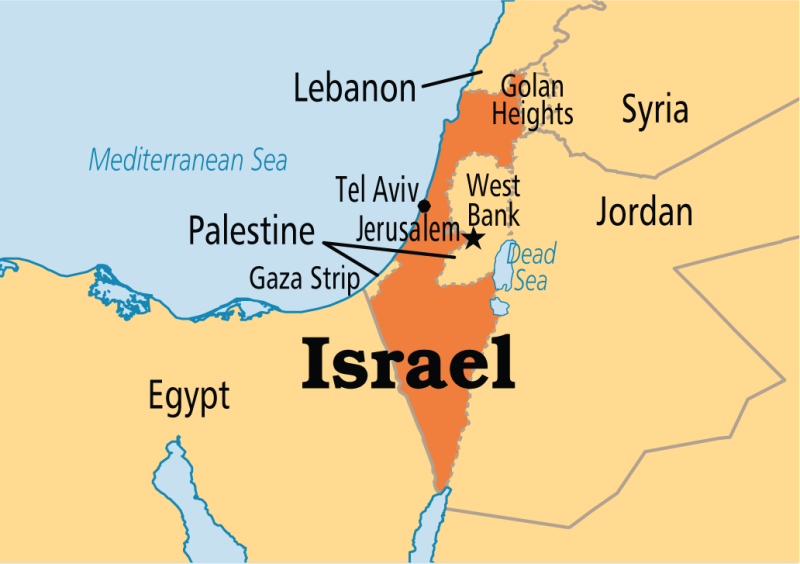On July 8th, Israel launched Operation Protective Edge, a military response to rockets fired from the Gaza Strip by Hamas. The operation is currently in its 50th day. If you watch the news, you’ve heard about the strikes back and forth between Israel and Hamas. You’ve heard about the deaths of civilians and the destruction of property on both sides. You’ve heard many condemn Israel as being disproportionate in its use of force; you’ve heard many defend Israel for its use of force. Whatever the case, emotions are high and battle lines have been drawn.
In America, especially in Christian circles, it seems that the lines are drawn rather simplistically. Dennis Prager summarizes the conflict between Israel and Palestine as “one side wants the other side dead.” The glaring problem with such a statement is that there are more than two sides involved. When we think of the conflict as “Israel vs. Palestine” without distinguishing the Palestinian Authority from Hamas, or the West Bank from Gaza, we’ve accepted a false narrative. Prager uses general terms such as “Palestinians,” “Palestinian people,” or “Palestinian leadership” when describing the side that wants to kill the other. This causes his audience to see no distinction; they are left to assume that all Palestinians are thirsty for Israeli blood. Some clarifications are in order.
The Arab-populated territory known as Palestine is divided into two sections: the West Bank and the Gaza Strip. Cities in the West Bank are governed by the Palestinian Authority (PA). Israel agreed to the creation of the PA as a legal entity in 1993 during the Oslo Accords. The PA recognizes Israel’s right to exist, denounces terrorism, and seeks peace through diplomacy. Cities in the Gaza Strip, however, are governed by Hamas, which is considered a terrorist organization by many countries. It is Hamas who fires rockets into Israel and who denies Israel’s right to exist. Hamas is Palestinian, but so is everyone who lives in the West Bank and the Gaza Strip. “Palestine” refers to a geographical area, not a legal entity or political allegiance. Lumping all Palestinians together with Hamas is therefore lazy and dishonest.
Prager doesn’t mention the situation of Christians in the land, either. There are an estimated 50,000 Christian Arabs in the West Bank, with nearly 1,500 in Gaza. These Palestinians aren’t harming Israelis, yet they suffer great loss alongside their Muslim neighbors. If a school or hospital gets destroyed, Christians are affected. When blockades prevent travel between cities, Christians can’t go to work. When homes are invaded to rout out terrorists, Christian property is damaged. Christians in the United States care greatly for the Israeli people, and rightfully so. But we must not forget our Palestinian brothers and sisters; we are both Abraham’s children. When we support Israel’s right to defend itself, are we also promoting the safety of God’s people?
There are other problems with Prager’s explanation. He fails to mention why many Arabs are upset with Israel in the first place. You’d think an overview of Israel and Palestine would include the important details. Conveniently, they are absent. He also presents Israel as the loving, peaceful side of the conflict even though there is a multitude of diversity within Israel. A growing number of Israelis condemn military strikes in Palestine and many Jews are against the Israeli state altogether. We see glimpses of Israeli terrorism from time to time, as well as expressions of racism toward Arab people.
Every side of this conflict is guilty of wrongdoing since every side involves sinful people. As time goes on, the facts of history will become distant and unclear. In many ways they already are. The ultimate solution is for Israelis and Palestinians to confess Jesus as Lord and seek first his kingdom. That’s when we’ll see true peace established in the land and only then will it be holy again.
Editor’s note: Links to outside sources were updated in 2023.



















Well said, Adam!
Excellent, Adam!
[…] Palestine ≠ Terrorism by Adam McIntosh challenges conservative Christians to think a bit more deeply about the Israel/Palestine situation and not jump to conclusions about Palestinians. It is worth a read. Adam is the son of missionary parents who were reaching out to Muslims in Israel and West Bank. […]